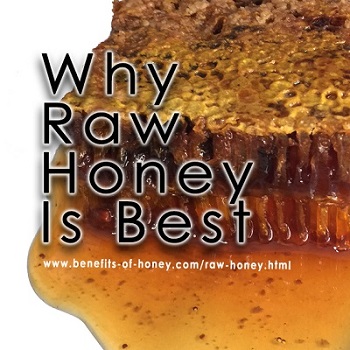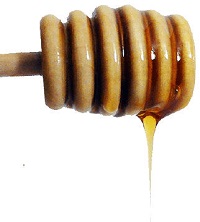
Do These 3 Labels Mean the Same? Natural Honey, Pure Honey, Raw Honey
Commercial or supermarket honey is labelled as natural honey, pure honey, raw honey, pure natural honey... and the list continues. It takes me by no surprise that honey, like any other products, is not spared from ambiguous labelling by suppliers. With so many different claims of honey on the shelf, we often land up feeling confused and unsecure about how much authentic honey and counterfeit honey we are consuming. Here, we would like to share a few frequently asked questions on the subject from visitors of Benefits of Honey and our views regarding them.
"I see so many different claims and labels of honey in the shop. What does the term "pure honey" actually mean?" Can I assume "pure honey" is also "raw honey"?

"Pure honey" literally can be taken to mean "100% unadulterated honey with no other contents (for instance, water, sucrose), flavorings or colorings added", or at least this would be what I think honey suppliers would hope how consumers read. However, things are not always so simple and straightforward. There aren't any legal standard for marketing "pure honey", so we can't rule out the possibility that "pure honey" simply means "real honey" and thus the product may contain "real honey" in an unknown amount not necessarily equivalent to 100%.
Whatever it is, the term "pure honey" can be ambiguous and even misleading. Many consumers in fact equate "pure honey" with "raw honey" as they assume that "raw honey" contains honey in the the most original form with nothing added to it and hence should mean the same as "raw honey". However, this is unfortunately so untrue about supermarket honey, which is mostly pasteurised (hence definitely not raw honey) and yet often labelled "pure honey".
Can I assume that "natural honey" means "unpasteurized honey"?
I don't think so. While honey retailers may wish that consumers would naturally associate or even equate the "natural honey" label with meanings of "unpasteurized honey" or "raw honey", the fact is the "natural" label on honey does not render it any more special than other honey. Most supermarket honey, even those labelled as "natural" is filtered and pasteurized or treated with heat to slow down the process of crystallisation so that they remain smooth and presentable on the shelves. (Ironically, sparkling and speckle-free honey is somewhat perceived by consumers as good quality honey.)
Today, most raw, unpasteurized honey is directly purchased from the beekeepers or local honey farms (National Honey Board Honey Farm Locator), which are not always within the reach of every consumer. Furthermore, every country has its own regulations regarding the "pasteurized" labelling; for some countries, the term "unpasteurized" label on honey is prohibited, but you can find the label "raw" instead.
Since cream honey appears more concentrated, is it then more "pure and natural" than than liquid honey?
Form is not a factor in judging the nutritional value of honey. Cream honey, which is formed by allowing the honey to granulate at a controlled temperature of about 55 degree F. (without affecting or harming its quality and nutrients), can be better in terms of convenience for some consumers who find it less messy to spread the honey over toast, biscuit, however, it is not in any way superior to liquid honey in terms of its purity and nutrition contents. Comparatively, liquid honey works better for drizzling over pancakes, waffles, etc and mixes easily with water or foods such as vegetable salads, but again, with all things being equal, it doesn't yield more health benefits than cream honey.
Finally, my favourite personal quote which sums up my sentiments regarding purity of honey:

Related Articles
1. Discover how much you know about honey with this quick quiz. Your quiz results might well surprise you! All in: Which Honey is The Best?.
2. Get these facts straight to be clear about these terms and concepts - pure honey, creamed honey versus clear liquid honey, crystallisation of honey, honeycomb, monofloral varietals, darkening of honey, viscous versus runny honey, honey storage, and more in: Frequently Asked Information About Honey.
3. Get tips that would lend you clues on what to expect from reading honey labels: Natural Honey, Pure Honey, Raw Honey ~ Making Sense of Honey Labels.
4. Have troubles making sense of food labels? How much is truth and how much is pure marketing tactics? Read: Did You Know Reading Food Label Can Be So Tricky?
5. Lies, deceptions and myths underneath the labels of honey: Honey Are You For Real?
6. Choices - Raw honey, pure honey, organic honey, creamed honey: Which Honey is The Best?.